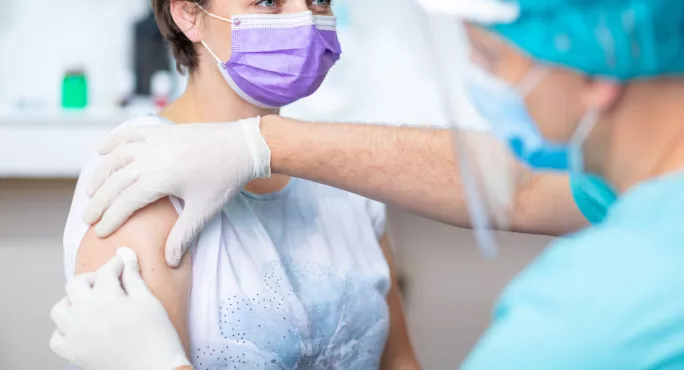How it feels to be a vaccinated teacher

This was to be the year the world got back on track. We’d be able to return to routine tasks such as shopping and going to the gym and, most importantly, we’d be able to spend time with our loved ones again.
Last year pulled the rug from under everyone’s feet and three weeks of school closures became months and months of adjusting. In education, we did what we always do - we adapted, we reflected, we planned and reflected more. Suddenly the part of teaching we enjoy the most - working with pupils in person - was taken away.
Some of us volunteered to work in the education and childcare hubs to support the children of key workers and our most vulnerable children. This wasn’t an easy decision to make: the fear of the coronavirus had gripped most of the world and science told us that any contact was risky.
Police chief: ‘Powerful case’ for vaccinating teachers
News: Partial vaccination of ASN staff ‘puts pupils at risk’
Background: ASN teachers call for blended learning over Covid fears
Related: Some special school staff to be prioritised for vaccine
Vaccination: No sign yet that teachers will get vaccine priority
Covid: ‘I’ve had the vaccine - now I can work without stress’
Despite the risk, there was a benefit that was immeasurable, and that was the opportunity to continue to teach in person. To continue building relationships with pupils and supporting their families lent a sense of normality to everyday life. We worked hard to ensure that children felt secure and safe in the hubs, but the worry was always at the back of our minds - what if we brought the virus into the hub?
Covid: ‘Now I’ve had the vaccine, my confidence is returning’
Working with pupils who have complex additional support needs (ASN is the favoured term in Scotland) means that you have close physical contact with them for most of the time you are together. Sometimes their care needs mean that two adults are in close physical contact. I still have this fear every day. How do you live with yourself if you unknowingly contribute to a pupil contracting a deadly virus?
But during the first lockdown in 2020, the number of pupils and staff in the hubs was kept to a minimum. We restricted the rest of our lives, even more than we were being asked to do. I remember getting upset with a lady in the supermarket who wouldn’t move away from me at the till. I was obviously afraid for my own family but I was more afraid for my hub pupils and their families. I often cried at various moments of the day with the stress of it all.
Yet the summer finally arrived and case numbers fell, which meant we returned to full-time schooling in August. Life seemed to hold hope that we would beat this virus. Fast-forward to Christmas, rising numbers, fear increasing across the country and cases in schools causing concern and worry for everyone. It was announced that we were returning to lockdown.
What did this mean for staff in schools working with pupils who have complex additional support needs? We started hastily assembling our blended learning plans.
These plans ensured that the majority of our pupils would have some time in school but that numbers in the school at any one time would be reduced. It wouldn’t be full-time schooling for every pupil but it would be some in-school contact for as many pupils as possible. Those families who felt their children were safer at home would be supported in the blended learning model, too.
The reality, though, was that in January, whilst the majority of mainstream pupils were learning remotely, we were told to reopen full-time to all pupils. This brought me back to random crying moments. Moments when fear took over and when I felt like a pawn in education rather than a member of the education community. It was far from a pleasant place to be.
I felt that the families trusted us to keep their precious children safe but the reality was no different than it had been in August or, indeed, last March when we closed. The pressure of this caused sleepless nights and moments when panic threatened to take over.
Requests from teachers in our sector to the government to reconsider definitions of vulnerability were challenged. Requests for clarity on additional mitigations were ignored. I can honestly say that it was the worst experience of my career.
So, where are we now? I have now received the first dose of the vaccine. We have access to better personal protective equipment. There is misting of school buildings taking place regularly.
It feels as though we are starting to matter again. It feels as though our pupils matter. My confidence is returning and I am reassured that progress has been made in helping to keep everyone in our school safe.
But I’ll never forget the soul-destroying worry the school staff in my sector were put through in 2021.
The author works in a special school in Scotland for children with complex needs. She does not wish to be named
You need a Tes subscription to read this article
Subscribe now to read this article and get other subscriber-only content:
- Unlimited access to all Tes magazine content
- Exclusive subscriber-only stories
- Award-winning email newsletters
Already a subscriber? Log in
You need a subscription to read this article
Subscribe now to read this article and get other subscriber-only content, including:
- Unlimited access to all Tes magazine content
- Exclusive subscriber-only stories
- Award-winning email newsletters